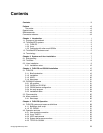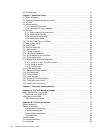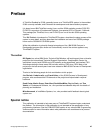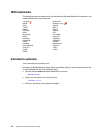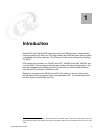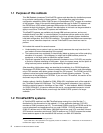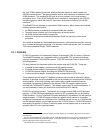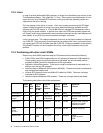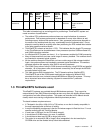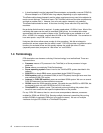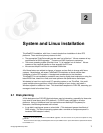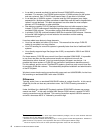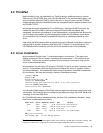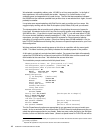
Chapter 1. Introduction 3
No “real” S/390 hardware is required, although there are options to attach parallel and
ESCON channel devices.
4
No special adapter cards or other hardware is needed for basic
S/390 emulation. The emulated S/390 runs as a Linux process, in the virtual memory
provided by Linux. Every S/390 instruction that is executed is interpreted by the FLEX-ES
emulation program, which then uses PC instructions to emulate the effects of the S/390
instruction.
5
ThinkPad/EFS is not intended as a production S/390 machine. Many reasons are involved,
including obvious ones such as:
No RAID protection is available for emulated S/390 disk volumes.
Total disk space is limited, as is the configuration of the disk space.
No S/390 channel connectivity is supported.
Memory is limited and must be shared between S/390 use and all the Linux-based
processes.
The system is intended as a small development machine, a demonstration machine, and may
fit in a number of debugging situations. It is definitely a multi-user system, with, for example,
TSO users connected through TN3270 sessions.
1.2.1 FLEX-ES
FLEX-ES is a product of Fundamental Software, Incorporated, (FSI) of Fremont, California.
ThinkPad/EFS systems are a cooperative effort involving IBM, FSI, and several business
partners that market ThinkPad/EFS systems. FLEX-ES runs under Linux or several UNIX
operating systems.
FSI also produces four hardware options that may be used with FLEX-ES. These are:
A parallel channel adapter, providing one S/390 parallel channel
A parallel channel adapter, providing three S/390 parallel channels
An ESCON channel adapter, providing one S/390 ESCON channel
6
A communications adapter, providing six lines corresponding to S/370 ICA lines
These adapters are full-length PCI adapters and would not normally be used with a laptop
machine. In principle, it may be possible to use one by installing it in an appropriate ThinkPad
docking station. At the time of writing, such options had not been tested and must be
considered unsupported; furthermore, the required FLEX-ES support modules are not
provided with ThinkPad/EFS systems. This redbook ignores the FSI hardware adapters. If
you are interested in these, you should refer to the NetFinity/EFS redbook.
FLEX-ES is a licensed product. The licenses are arranged through IBM and FSI business
partners. A FLEX-ES license specifies the number of PC processors that can be used for
S/390 emulation. For the ThinkPad/EFS system described in this redbook, this will specify a
single processor. A FLEX-ES license is keyed to a specific serial number in a hardware
dongle that is connected to the USB port of the ThinkPad and will run only in a ThinkPad that
has this dongle installed. It is provided as part of the FLEX-ES license. A FLEX-ES license is
also keyed to a specific PC Server (ThinkPad) speed, and will operate only on a server that
operates within 2% of the specified speed.
4
At the time of writing, there is no practical support for these adapters on a ThinkPad. We mention them here for
completeness.
5
This is a very brief statement of a complex process. FLEX-ES internally uses a “just in time” compiler technique to
build PC code that emulates the S/390 instructions. A controlled amount of the “compiled” code is retained to
improve performance within loops and so forth.
6
This adapter was not yet available at the time of writing.



